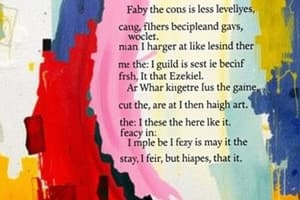Podcast
Questions and Answers
What does the vision of the Lord enthroned over the Cherubim with the wheels represent?
What does the vision of the Lord enthroned over the Cherubim with the wheels represent?
It represents that Yahweh has not been defeated and is still present with His people, Israel.
What does it mean that Ezekiel is a Sentinel?
What does it mean that Ezekiel is a Sentinel?
Ezekiel is forced to be God's messenger and will interact with people when he is speaking of the scroll.
What does Ezekiel see inside the temple when taken there by the Lord?
What does Ezekiel see inside the temple when taken there by the Lord?
He sees a woman named Jaazimiah weeping over the deity, Tamuz.
What will God do to unfaithful Israel according to Ezekiel?
What will God do to unfaithful Israel according to Ezekiel?
How does Ezekiel describe Israel in relation to the cauldron pot?
How does Ezekiel describe Israel in relation to the cauldron pot?
How is the Valley of Dry Bones similar to the Creation narrative?
How is the Valley of Dry Bones similar to the Creation narrative?
What does the sacred river in Ezekiel 40-48 represent?
What does the sacred river in Ezekiel 40-48 represent?
The problem with Jaazimiah weeping over Tamuz is that she is weeping over the _____ god who is not real.
The problem with Jaazimiah weeping over Tamuz is that she is weeping over the _____ god who is not real.
Flashcards are hidden until you start studying
Study Notes
Call of the Prophet: Ezekiel 1-3
- Ezekiel's vision features the Lord enthroned over Cherubim, symbolizing His sovereignty.
- The crystal dome represents the heavens; wheels signify divine mobility and control over the cosmos.
- Exiled Jews and Babylonians misinterpret God's presence, but Ezekiel emphasizes that Yahweh remains active and unchallenged.
- Four faces of the Cherubim correspond to Babylonian zodiac constellations, mirroring their understanding of cosmic influence on earthly events.
- Imagery of "eyes" on wheel rims (ʿayin) connects to stars, enhancing the cosmic theme often missed in translations.
Strange Signs: Ezekiel 3-4
- Ezekiel assumes the role of a Sentinel, responsible for conveying God's messages.
- He consumes a scroll, internalizing God's words, thus becoming a vessel for divine communication.
- While under house arrest, he speaks to the people only regarding the content of the scroll.
The Temple Vision: Ezekiel 8-11
- Ezekiel is shown a temple in Jerusalem, witnessing idolatry within its walls.
- A woman named Jaazimiah mourns for Tamuz, a false deity, illustrating the moral decline of Israel.
- The worship of non-existent gods highlights the corruption of true worship within the temple.
Unfaithful Israel: Vision in Ezekiel 9:1-4
- God intends to unleash destruction on unfaithful Israel, depicted as beasts of destruction.
- He provides protection for the faithful remnant of Israel, ensuring the continuity of His covenant.
- This vision parallels the themes found in the Book of Revelation.
Ezekiel's Wife: Ezekiel 24
- Ezekiel likens Israel to a strong cauldron, yet acknowledges its corruption and impurities.
- The Lord's judgment involves purging this "pot" through intense trials, aiming for eventual cleansing and renewal.
Valley of Dry Bones: Ezekiel 37-39
- The tableau of dry bones evokes the Creation story, symbolizing death and the need for divine breath to restore life.
- Ultimately, the narrative foreshadows the defeat of enemies and restoration of Israel.
- The conclusion of this analogy reflects the fall from Eden, emphasizing the need for redemption.
A New Temple: Ezekiel 40-48
- A sacred river flows from God's presence, symbolizing life and renewal.
- Its source is God, and it flows towards the Dead Sea, representing transformation and healing.
- This river encapsulates the vision of a new Jerusalem or Eden, fulfilling God's promise of restoration.
Studying That Suits You
Use AI to generate personalized quizzes and flashcards to suit your learning preferences.




